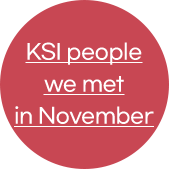
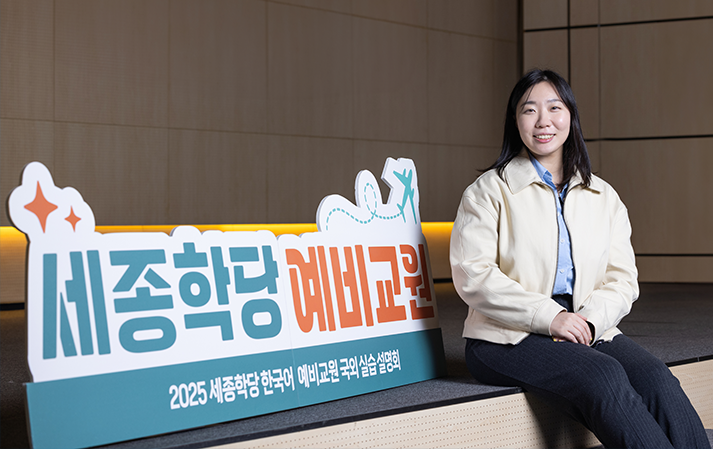
Meeting with Lee Eun-hye,
a 2024 Prospective Korean Language Teacher
from King Sejong Institute
The KSI Prospective Korean Language Teacher Overseas Practicum program supports students majoring in Korean
language education at domestic universities (or graduate schools) by sending them to KSIs worldwide to gain
teaching experience before becoming certified Korean language teachers. In September, we met Lee Eun-hye, who
participated as a prospective teacher at KSI Hanoi1 in Vietnam, to hear about her learning and growth as a
Korean language teacher.
Hello, Lee Eun-hye! Nice to meet you. Could you introduce yourself to the readers of Monthly Knock Knock?
Hello! I’m Lee Eun-hye, and I participated in the 2024 KSI Prospective Korean Language Teacher Overseas
Practicum program, completing a 4-week teaching practicum at KSI Hanoi1. I majored in English and Korean
literature at The Catholic University of Korea and completed a master’s program in Korean Language Education at
the university’s graduate school. Since my thesis hasn’t been approved yet, I don’t have a teaching certificate,
but I have completed my master’s coursework.
What motivated you to apply for the KSI Prospective Korean Language Teacher Overseas Practicum program? Did
you have any prior experience teaching Korean?
I was feeling quite discouraged and mentally exhausted due to prolonged difficulties with my thesis. During this
time, I came across the announcement for the KSI Prospective Korean Language Teacher Overseas Practicum in a
chatroom for Korean Language Education students at The Catholic University of Korea. I applied immediately. I
saw this as an opportunity for a prospective teacher without a teaching certificate to gain practicum experience
abroad. I hoped the experience would help me refine the direction of my thesis and give me a chance to recharge.
Although I didn’t have formal experience teaching Korean, I had participated in language exchange programs
online, where I paired with foreigners to teach each other our respective languages. For about 7 months, I
taught a French student Korean while learning French myself. While it wasn’t formal teaching, it was a similar
experience. It was a valuable time where we taught and learned practical, everyday language.
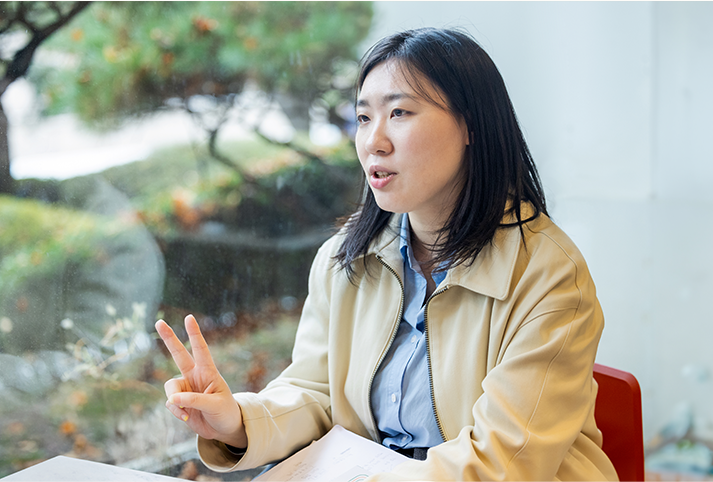 Lee Eun-hye Describes the Prospective Teacher Practicum
Lee Eun-hye Describes the Prospective Teacher Practicum
How did you feel when you were selected as a prospective teacher and were preparing for your dispatch?
In my case, I was assigned to a KSI designated by KSIF rather than my preferred location. I had no prior
information or experience with Vietnam, so it felt unfamiliar. However, I saw it as a precious opportunity given
by KSIF and decided that I had to go no matter what. I believed there would be valuable lessons to learn there.
I resolved to make the most of the practicum by experiencing Southeast Asian and Vietnamese culture and teaching
learners with a shared cultural background.
What kind of activities did you mainly engage in after being dispatched to KSI Hanoi1? Please provide a
detailed explanation of the practicum.
At KSI Hanoi1, I fully experienced a semester-long process following the weekly practicum plan, including class
observation, teaching practice, cultural class demonstrations, evaluation, proficiency testing, and the
graduation ceremony.
The practicum was initially designed for in-person classes, but sometimes it shifted to online formats depending
on the situation. During my sessions, I used three materials from the Sejong Korean 1B and 2B series: the main
textbook, workbook, and supplementary activities. For online classes, it was difficult to observe learners'
reactions and conduct classes using only Korean. Due to the nature of language instruction, there were times
when grammar explanations took longer, leaving less time for workbook activities. In contrast, during the
in-person practicum, I could make eye contact and communicate directly with the learners. This allowed me to
explain grammar and complete all the activities in the textbooks effectively. Experiencing both online and
in-person classes gave me insights into the strengths and weaknesses of each teaching format.
I also led a Korean culture class on mother-of-pearl craftwork, which I learned during the pre-dispatch
training. Additionally, during the proficiency evaluations, I observed the preparation and execution stages in
both the waiting room and the examination hall. The proficiency test included 5–10 minutes of speaking, 25
minutes of listening, 25 minutes of reading, and 30 minutes of writing. Observing the entire process helped me
reflect on how to tailor my teaching methods based on each learner’s level of Korean proficiency. For example,
it was an opportunity to think about how to support learners who couldn’t understand Korean instructions, those
who stuttered, or those who struggled with grammar.
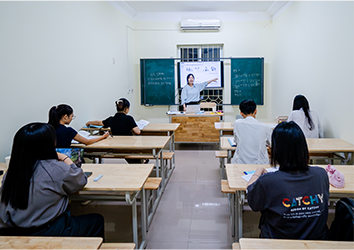
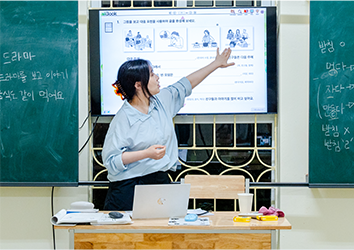
Lee Eun-hye Teaching a Korean Class at KSI Hanoi1 During the Practicum
During your 4-week practicum, were there any particularly memorable episodes? I’m curious if there were
moments that significantly contributed to your growth as a prospective teacher.
In the Korean culture class, we made mother-of-pearl phone grips, and I vividly remember how fun it was to
engage 40 to 50 learners and keep their interest. However, the class ended earlier than expected, so on the
spot, I created a survey form about the Korean language class and conducted a quick feedback session. Although
it was unplanned, the survey allowed me to gather learners’ opinions about their understanding of the Korean
explanations, their satisfaction with the class topics, their experience with Korean culture, and the activities
they wanted to try. One advanced-level learner volunteered to help me by translating the survey content into
Vietnamese, writing it alongside the Korean text, since I didn’t know Vietnamese. The learners also wrote
endearing comments on the survey forms in Korean, like “The teacher is cute” or “Thank you,” which made me feel
grateful and proud. Through this experience at KSI Hanoi1, I learned how crucial it is to create a sense of
empathy and connection using Korean as a medium in each class.
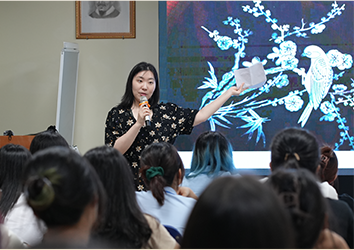
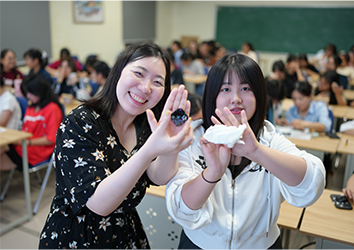
Lee Eun-hye’s Korean Culture Class: Making Mother-of-Pearl Phone Grips
You also observed Korean language classes at KSI Hanoi1. What insights did you gain from directly experiencing
the Korean language education environment?
I felt that Vietnamese culture shares many similarities with Korean culture. The focus on family, the way
neighbors communicate closely, and the influence of Buddhism are strikingly similar. Additionally, in Vietnam,
K-pop, Korean dramas, and other aspects of Korean culture are already widely popular and frequently shown in the
media. Because of this familiarity, Vietnamese learners seemed to take great pride simply in learning Korean,
and their expectations for Korean classes appeared high. Seeing this firsthand made me realize that, as a future
Korean language teacher, studying the history and culture of the region where I’m dispatched is essential. This
experience also sparked my interest in teaching methods related to Korean traditional games and cultural
activities that I can share with learners.
How was your experience with your mentor teacher, Lee Min-seok, during the practicum? Could you share any
advice or lessons you received from him?
Meeting Lee Min-seok, my mentor teacher at KSI Hanoi1, was truly a stroke of luck. He took great care to ensure
I experienced the raw culture and daily life of Vietnam. Despite the short 4-week period, he created
opportunities for me to fully experience everything—from accommodations, the local economy, cost of living,
cultural experiences, public transportation, to food. Additionally, Mr. Lee Min-seok shared as much as he could
about the insights he gained from teaching Korean in Vietnam. As a senior Korean language teacher, he offered
invaluable and forward-looking advice. He showed me how to approach learners not just by strictly adhering to
teaching guidelines, but also by engaging with the vibrant local culture in a way that makes education more
relatable. I am sincerely grateful to Mr. Lee Min-seok for teaching me practical methods to connect with
learners beyond textbook preparation.
After returning to Korea, you shared your practicum experience as an outstanding participant at the 2025 KSI
Prospective Korean Language Teacher Overseas Practicum Briefing Session. What message did you want to convey
to those aspiring to become prospective teachers?
I wanted to say, “If you’re interested, just go for it.” Even after completing the preliminary training and
applying, I still had doubts right up until the final interview day. I kept asking myself, “Can I do this well?
Is this the best decision? Is this the right path?” Although I wasn’t assigned to my preferred location, an
unexpected opportunity came my way, and I seized it. The moment you take on a challenge, your transformation
begins. Both big and small things start to happen. If you don’t challenge yourself, nothing happens. Don’t be
too afraid to try; don’t let fear hold you back. Once you take that step, you’ll find opportunities to learn,
and one day, you’ll realize that your path has become a little clearer and brighter.
Presenting at the 2025 KSI Prospective Korean Language Teacher Overseas Practicum Briefing Session
What kind of Korean language teacher do you aspire to be in the future? How has this practicum experience
influenced your direction as a Korean language teacher?
The experience of being dispatched abroad and teaching Korean through the KSI Overseas Practicum was unique and
special. During each stage of the practicum, I realized how important it is to establish educational values as a
Korean language teacher. My perspective on teaching methods has also changed. I now want to support Korean
language education that isn’t one-sided or uniform but rather closely aligned with the learners' cultural
backgrounds and lifestyles. Once my master’s thesis is approved, I plan to apply again to be a dispatched
teacher with KSI. No matter which country or region I’m assigned to, I will strive to become a Korean language
teacher who can immerse in the local culture and empathize with learners' perspectives. My goal is to be an
inclusive and adaptable educator who truly understands and respects the backgrounds of my students.